Of all the career paths offered to player characters in the venerable tabletop roleplaying game Traveller1, few were as memorable as that of the scout. Stalwart explorers of empire’s hinterlands, scouts could expect a charmingly informal command structure, a good chance of a loaner starship on retirement, and, oh yes, the life expectancy of a newborn puppy in a crocodile-filled swamp. Classic Traveller was notorious for its character generation system: player characters could and often did expire during the process. Few careers offered the harrowing mortality rate of the scout class.
Traveller author Marc Miller drew inspiration from classic science fiction, whose authors delighted in dropping explorers into situations for which the explorers soon discovered they were insufficiently prepared. Here are five tales of the sort 2 that inspired Traveller.
“Pictures Don’t Lie” by Katherine MacLean (1951)
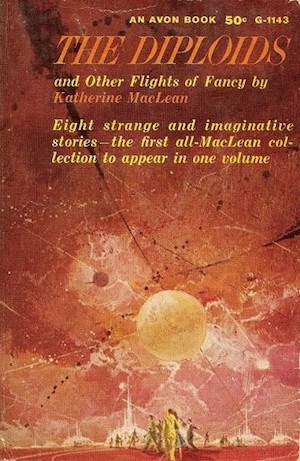
Department of Military Intelligence radio expert Mr. Nathen was astonished to discover alien signals hidden in stellar static. Even more astounding was the revelation that the signal source was approaching, that a ship full of bold (and as far as Nathen could ascertain, friendly) alien explorers was bound for Earth. First contact between Earth and the stars is at hand.
However, while neither side is secretive, communication is shaped by unexamined assumptions. Perplexing details are dismissed because they contradict what is thought to be known. By the time the significance of certain anomalies is understood, it is far too late.
This was my introduction to MacLean, one that ensured that I would seek out more of her work. It’s quite possible I read “Pictures” in Invaders From Space, whose cover looks familiar. However, I cannot rule out having listened to the superlative X Minus One radio adaptation, rebroadcast on disco-era CBC Radio.
Memoirs of a Spacewoman by Naomi Mitchison (1962)
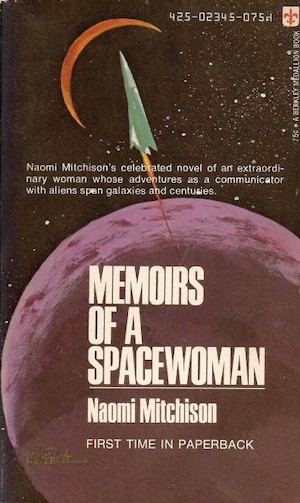
Humanity has learned from its early, clumsy exploration of Mars and Venus that careless meddling with other cultures and species can result in genocide. Hence interstellar explorers such as Mary have abjured interference in the cultures they encounter, no matter that desperate circumstances might seem to justify intervention. Exploration is a challenging career that tests Mary’s skills and resolve.
The good news is that this short, dense classic is still available for purchase. The bad news, at least for ebook readers, is that no ebook appears to exist. Collectors of vintage editions may want to avoid the 1976 SF Master Series edition, whose introduction by editor/literary agent Hilary Rubinstein scouted new frontiers in sexist patronizing.
The X Factor by Andre Norton (1965)
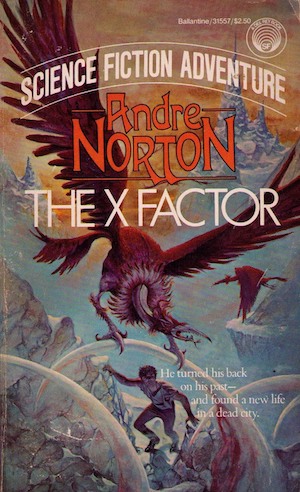
Scout Renfrey Fentress had a eugenic duty to father as many children with as many women as possible, in the hope that some might be of Scout quality. The Decree of Departure, immediate and mandatory divorce imposed as soon as the Scouts received new assignments, ensures that boys like Diskan Fentress grow up fatherless. Reunited with Renfrey, Diskan concludes that in his case eugenics failed. Rather than burden his father with a second-rate son, Diskan steals a starship and enigmatic navigation tape before fleeing into space. In short order, Diskan is marooned on an alien world that will more than provide him with a chance to prove his worth. Or die.
Granting that command structures in Norton novels could be problematic at best, the Scouts in this novel manage to be irredeemable asshats. Poor, unconfident Diskan might be one of the lucky products of the Scout breeding system, which seems calculated to deliver miserable childhoods to as many people as possible. This being a Norton novel, running away from the situation won’t necessarily make Diskan’s life better, although it certainly will make it different.
The Luck of Brin’s Five by Cherry Wilder (1977)
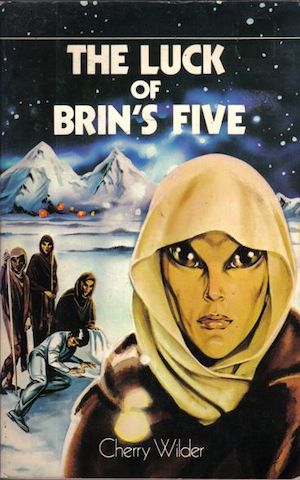
The extraplanetary explorer who complicates the lives of a family of alien farmers arrives as so many space explorers do, in a flaming vessel plummeting out of the sky.3 Human explorer Scott Gale survives, but his space plane does not. All hope of reuniting with the rest of his team depends on the ingenuity of Brin’s Five, impoverished farmers on the brink of starvation, and on not being noticed by the local ruler, the ominously named Strangler.
The Luck of Brin’s Five is an example of a subgenre that was at one time fairly popular: anthropological SF exploring contact between humans (often isolated) and aliens, told from the alien perspective. I am fond of that genre and wish there were more examples.
The Only Neat Thing to Do by James Tiptree, Jr. (1985)
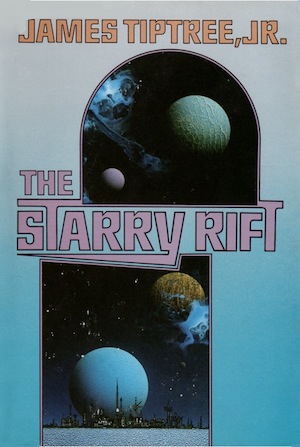
Inspired by tales of the Star Age, sixteen-year-old Coatillia Canada Cass uses her brand-new space coupe for more than bopping around the known world. She sets out to emulate her heroes by delving into the unknown galactic reaches, where many have ventured and few returned. Cass unravels a baffling mystery—the fate of a missing starship—but alas, teenage exuberance does not confer invulnerability (or even good odds of seeing seventeen).
Andre Norton and James Tiptree, Jr. never collaborated to my knowledge. Probably just as well, given how bleak Norton and Tiptree were on their own. In this particular Tiptree work, however, even rudimentary safety procedures combined with a soupçon of due diligence would have yielded very different results. This may be an argument for not handing exuberant sixteen-year-olds their own spaceships.4
***
Thrilling tales of space scouts and galactic exploration were and are popular. Too many examples exist for me to try to list them all. Don’t let that stop you all from trying, down in comments, which are, as ever, below.
In the words of fanfiction author Musty181, four-time Hugo finalist, prolific book reviewer, and perennial Darwin Award nominee James Davis Nicoll “looks like a default mii with glasses.” His work has appeared in Interzone, Publishers Weekly and Romantic Times as well as on his own websites, James Nicoll Reviews (where he is assisted by editor Karen Lofstrom and web person Adrienne L. Travis) and the 2021 and 2022 Aurora Award finalist Young People Read Old SFF (where he is assisted by web person Adrienne L. Travis). His Patreon can be found here.
[1]Traveller’s 50th birthday is but four years away.
[2]Judicious phrasing used because one is from 1977, a bit late for Miller to have read it before writing Traveller, and another postdates Classic Traveller.
[3]Entrusting the construction of space craft to the lower bidder is not merely fiscally prudent but an excellent way to give spacefarers opportunities to rise to the occasion.
[4]Most of my theatre coworkers are much younger than I am, which isn’t terribly surprising because most people significantly older than I am will have died of old age, or are soon to do so. Among the many differences between my cohort and theirs that I’ve noticed: younger people tend to start driving at a much older age than my cohort did, and far fewer of them have had catastrophic car accidents. I cannot help but feel those two facts are related.










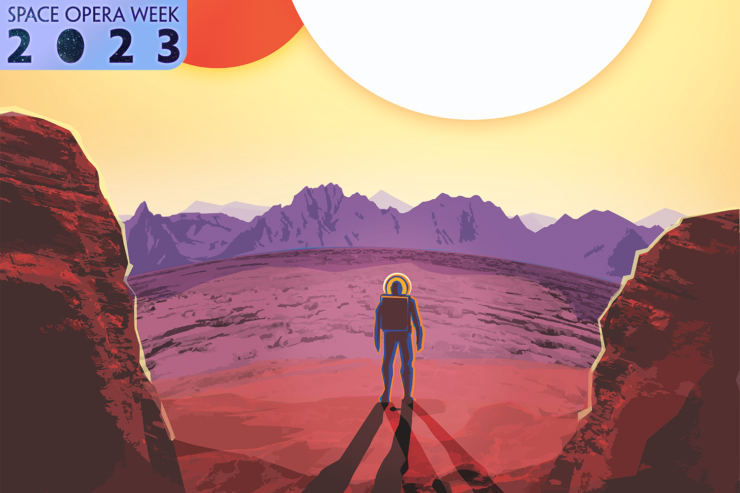
I haven’t read The X Factor but I watched a few episodes of the TV series. They sure changed things from the book version!
The Road of Icarus (1974), by the Bulgarian SF writer Liuben Dilov. A young crew member – born on a sub-light spaceship – struggles to find a place among the crew and… among the stars, just to disappear at the end. Is this an accident or something else? A. Strugatski said that this was one of the top 5 SF novels written in Easter Europe.
I think Le Guin’s first (published) novel, Rocannon’s World, fits this niche rather nicely.
I noticed the interesting balance in the authors: three women, two ineluctably masculine.
(The Internet being what it is, I have to note irony. https://blogs.uoregon.edu/tiptree/2016/08/02/1967-1976/ )
Lee and Miller’s Liaden Universe ™ books feature Scouts of many differing flavours. Occasionally we see them actually out Scouting, but just as often we find them meddling in various worlds’ politics (or in peoples’ lives. The politics may be safer).
James Blish’s VOR tells of an interstellar scout discovering Earth. As it turns out, VOR is its creators’ way of discovering if the alien species it discovers are capable of resisting them.
Ref: anthropological SF exploring contact between humans (often isolated) and aliens, told from the alien perspective. C. J. Cherryh’s “Cuckoo’s Egg”
And indeed, Book 1: Characters and Combat (1977 text) says:
1981’s Deluxe Edition is less grim (and sexist), and uses the nomenclature of the Third Imperium:
Anne McCaffrey’s Velvet Fields fits these criteria – it’s a short story around the 3.5k word count but says so much and is well worth a read.
Jack Vance’s four Tschai novels (aka Planet of Adventure series).
Some of Vance’s best work in this series, with three non-native alien species
vying with each other and the native Pnume species for control of the planet.
Earth scout Adam Reith spends the four volumes struggling to find and retrieve his
“space boat” while interacting with all four alien species and the many human inhabitants
who have been brought to the planet Tschai by unknown means as subjects of the three
contesting alien races. Hijinks ensue (or is that trade-marked?)
This thread would not be complete without Robert Sheckley’s The Minimum Man, where the perfect test if a planet is colonisable is sending a most clumsy and accident prone man they can find. If he survives – everyone can!
@12 Indeed, Sheckley was fond of this theme and used it in many stories.
Drunkboat.
I was touched by part the ending of “The Only Neat Thing to Do” when a final log recording is interrupted so a girl and her brain parasite can, completely off-screen, proceed to passionately, consensually, and loudly take each other’s virginity.
And I mean that, without sarcasm or irony.
That story gets more romantic in one subplot than entire novels, and I wish there was more SF like that.
She went on to do other things, but Cordelia in the Vorkosigan Saga got her start as a scout (in the first third of Shards of Honor).
@12: thank you — that story was my first thought when I read the topic, but I was blanking on the name. The twist ending(s) was(were) especially good Sheckley.
Eric Frank Russell is my favorite in this sub genre, with short story Diabologic (1961), where one scout single mouthly divides an entire world, and novel Next of Kin (1958), where one scout alone wins the war against a coalition of races and planets from within a prison.
And of course i second Adam Reith in the Tschai cycle by Jack Vance, and Minimum Man short story by Robert Sheckley.
Nb: Drunkboat (1963) was by Cordwainer Smith
I wonder if Burroughs’ Wrong-Way Carson would fit the bill?